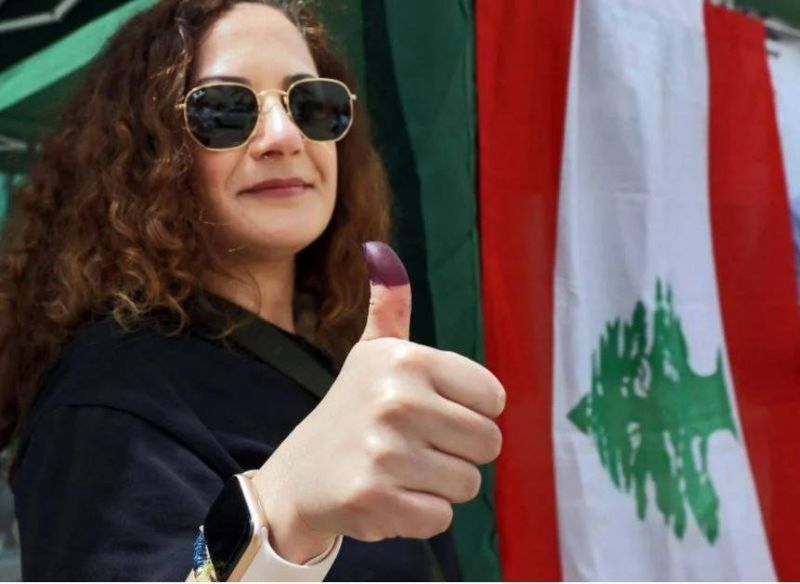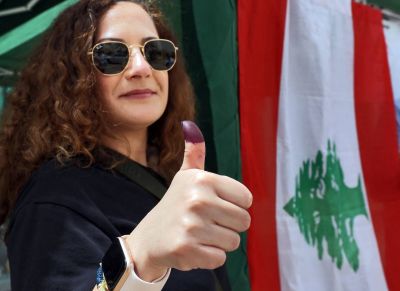
A Lebanese expatriate in Saudi Arabia shows her ink-soaked thumb after voting in Riyadh on May 6, 2022 in the Lebanese legislative elections. (Credit: Fayez Nureldine / AFP)
For the second time in Lebanon's history, the diaspora has had the opportunity to vote for the next term of the 128 members of Parliament. It comes as an opportunity for some of these Lebanese to express their frustration at a time when their country has been embroiled since 2019 in an unprecedented economic and financial collapse. L'Orient-Le Jour contacted a number of Lebanese voters based in Kuwait, Oman, Qatar, Iraq and Egypt who are voting today. Three years after the beginning of a popular uprising against the ruling class, the will for change is still there. But it now coexists with a disillusionment that will probably be expressed in the ballot box.
In Oman, where the Lebanese community is about 4,000 people, Bashir Chehab, general manager of the French company JCDecaux, which specializes in billboard advertising, is voting for the first time. He has been an expatriate for 16 years and has been living in Oman for three years. From the outset, he praised the "exceptional organization" of the vote.
‘It's a pity!’
However, Chehab noted the presence of delegates from the ruling political parties, mainly Samir Geagea's Lebanese Forces and Gebran Bassil's Free Patriotic Current.
"The Aounists wore an orange T-shirt. The LF had a pin. There was no one from the thawra or the opposition, or at least from our observations," he noted.
Many voters hoping for change were disappointed to see the inability of the thawra, the popular revolt of October 17, 2019, to unify around a common project. In fact, the opposition showed up in divided ranks for this crucial election. "It's a shame! There are too many lists of the thaoura," he said. For Bachir Chehab, three options were available. "Either I did not vote, or I voted blank, or I voted against the political parties in power," he summarizes.
‘It's time to punish’
"This is the first time I have voted in the legislative elections," confided a Lebanese man living in Kuwait, who works for a company specializing in office real estate, on the condition of anonymity.
"The voting is very well organized and I was able to vote very quietly," he said. When asked why he decided to break with his habit of boycotting parliamentary elections, he replied: "I was forced to emigrate in 1982. Today, the Lebanon we built is destroyed. It is time to punish those who are responsible for it."
This desire for change is also felt by Razan, 23, based in Doha.
"I want to be able to go back home, I want to build my life in Lebanon," she said. “I decided to vote in the hope of a better future for me, my parents and the Lebanese nation. This is our one and only hope after they (those in power, editor's note) put all their might into making the revolution fail.”
‘Clean and without any infraction’
Razan also observed a "clean and orderly" organization in the school where she went to cast her ballot, although she noted that the youngest voters were confused about the preferential voting option provided for in the electoral law.
Also in Doha, Karine Riachi and her husband Hazem Idriss, a couple describing themselves as environmentalists, were surprised to see in the morning the presence of the candidate Najat Saliba, member of a popular protest list in the Chouf.
"I was pleasantly surprised. It was very well organized. The crowd was not yet very large when I voted, and our little passport problems were quickly solved by the ambassador," Farah Berri, daughter of Parliament Speaker Nabih Berri.
"When we see what is happening in Lebanon, the shortage of medicines, the explosion of Aug. 4, 2020, the collapse of the education sector, the decline in the standard of living of our parents, we can only work for change and vote accordingly," says Karine.
In Riyadh, where Nancy Azar, an expatriate dentist from Kesrouan, is voting, the desire for change is also present.
"I am voting for a hope for change in Lebanon, so that we can return and work decently," she said. "I always thought I would be the last one to leave Lebanon. And here I am, in Saudi Arabia, looking for a job, because of the collapse of the medical sector.”
Oula, 51, a school principal from Tripoli, lives in Jeddah.
"I voted for the new figures, those who seem honest," she says. "It is my responsibility as a Lebanese citizen and because I am tired of these old corrupt politicians. We used to be pioneers in all fields. Today, we have unfortunately become a handicapped country."
In Cairo, the organization of the vote seemed more chaotic. Mira, who has been a resident of Egypt for two years, says she waited two hours. In 2018, she had voted in Beirut II in favor of a list of candidates from the opposition. This year, she plans to do the same.
"I will decide once in the voting booth, but for now, I am leaning more towards the Beirut the Change list," says the 31-year-old woman.
Vote against Hezbollah
In Erbil, in Iraqi Kurdistan, Lama* hesitated a lot before slipping in her ballot, and then explained that she finally "voted for something useful" — i.e. "against Hezbollah."
"I voted because I don't want Hezbollah to have control over Lebanon anymore. So that new presidents of the Republic, the Parliament and the Council are elected or appointed," she explains. The 24-year-old woman is a voter in the Bekaa I constituency in Zahle. She explains that she would have preferred to vote for candidates from the thawra, but the multitude of lists "forced" her to cast a ballot for the list Zahle the Sovereign, supported by the Lebanese Forces.
The 30,929 Lebanese living in Iran, Oman, Saudi Arabia, Qatar, Bahrain, Kuwait, Syria, Jordan, Iraq and Egypt, where Friday is a holiday, were called to go to the polls at 5:30 a.m. this morning Beirut time. Voting will continue on Sunday in 48 other countries, where 194,348 emigrants are registered to vote.
In Lebanon, the voting will be divided into two stages: first, on May 12, for delegates and polling station employees, and finally on Sunday, May 15. Opposition candidates hope that the diaspora will vote for change in the political class. In 2018, only 6 percent of foreign voters chose independent candidates, according to a recent report by the Paris-based think tank the Arab Reform Initiative.
*The person's first name has been changed at his request
This article was originally published in French in L'Orient-Le Jour.
